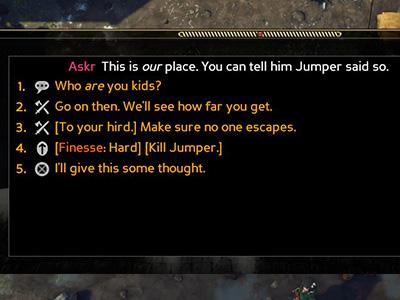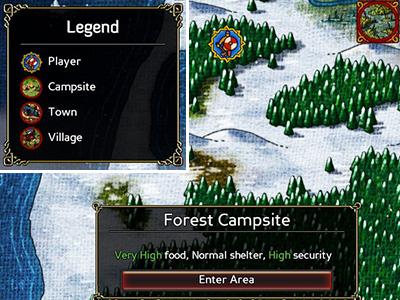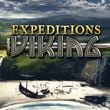General hints
The initial difficulty level is high, which makes it very important to create your character properly. If, at first, if the course of event is not what you have expected, e.g. if you want to play a diplomatic game, do not hesitate to start over. Otherwise, you will be complaining about mismatched skills throughout the entire game. Of course, you can always complement your shortcomings, but you will not always be able to rely on them, and some of the skills affect the main character only. It’s a good idea to try out your character and, after an hour or two of playing, to start over with a better-matched set of skills. Character creation has been discussed later in the text.

The classic system of leveling up and gaining experience is absent from the game! What you obtain instead is only skill points which you spend on learning new skills and upgrading the ones previously selected.
The game allows you to pick your own playing style. You can be a typical war-waging Viking, or a peaceful merchant in search of new trade routes. It is also possible to mix these two and pick what’s more suitable for you at a given moment. All depends on you and on what kind of a Viking you want to be.
In the game, there are 9 materials. The most important one is Valuables, which makes for an in-game currency and is the basis for trading. Apart from that, you can obtain Wood necessary for the growth of your village, but also for production and repair of your armor and weapons. Rations and Meat are your only food. The former does not have any best-before date, but meat goes bad relatively quickly. You can craft your own rations in camps, or buy them in towns. Medicine and herbs are used for treating your party members. You can turn herbs into medicine using witchcraft. The final resource is thralls, which are a highly valuable resource that you can use for speeding up construction works at your village. Apart from that, you can find such items as clothes, sticks, vials, etc. They can be used for crafting additional items, such as traps torches and health potions.
While exploring, you can loot crates, barrels and other objects. Sometimes, you can obtain only crafting materials, but also you can find resources and valuables in them. If, while picking such items, a red icon appears, this will mean that you will have to steal a given object. If you fail, you will have to face the consequences. To make things easier, while looking for such items, hold down the ALT key, which highlights all of the objects, doors and NPCs that you can interact with.
It is impossible to fail a storyline mission. This means that the action will go on and there will always be a denouement and the story will continue. All this translates into what you will gain or lose, and how this will affect your reputation with your party, dwellers or other characters. For example, in the first event in the game (the duel with your brother), the game suggests that you have to win, or you will not be able to stand at the head of the clan. However, if you lose, another party member will kill your brother by surprise . This way, however, you will be unable to recruit your brother for the party and you will have to decide your party member’s fate (you can chase him away, include in your party or kill him). Such situations abound in the game.

Decisions. In nearly every conversation, you will face a choice, where even the dialogue option you pick (aggressive or amicable) affects the action. If you meet a character whose portrait does not present a dark silhouette, you can be sure that they are important for the game. After you give certain responses in conversations, you can find out about the reaction of your party members by looking at the upper-right corner of the screen. Each one of the party members is described using 4 characteristics, e.g. honourable, cunning or amicable. Your decisions and the way you talk to others will be reflected by your relations with the rest of the party (even with the ones that are currently staying at the camp). The more your party members are favourable towards you, the better they fight. Apart from that, neutral characters may become hostile or friendly towards you, and nearby villagers may start to either favour or fear you.

You can affect conversations with high Perception and Sense. Also, Diplomacy and Leadership can help you. Finesse comes in handy when you have the option to attack somebody during a conversation, and while thieving on crates and barrels.
While training your character in a give weapon, try to reach the cap of that skill, before you change to another weapon. Thanks to this, your character will deal much more damage without the necessity to change the weapon. The only exception is maxing out of the shield, or the secondary weapon for the archer/sling shooter (so that he can defend during battles).
During battle, eliminate opponents one after one, instead of fighting all at once. The game’s combat mechanic is difficult. An opponent with 1 HP is still a dangerous one and, with time, you will be encountering groups more numerous than yours. Always fight with the smaller group of opponents and try to split them whenever possible. Ensure yourself with good equipment use tactical skills (the red ones) and match them to situations. Take advantage of narrow passages to fight one opponent at a time. Also use flanking to deal more damage – position your warriors on both sides of the opponent. Make sure that several of your party members are dual-wields (spears, double-handed axes), archers and slingshot shooters, who can also be medics, if necessary. Do not leave the proximity to your opponents, if not necessary – both you and them have one occasional attack each for such situations. Remember that your warriors fare off worse, if hungry or tired.
Your hero and your party members cannot die during the battle, but they receive the incapacitated status instead. The more time they spend in this condition, the more damage they take. If you manage to defeat your opponent quickly, you will not suffer any losses, even if the majority of your party was down on the ground. If anybody from your party sustains injuries, you have to heal them in your camp, using skills of your companions. The more wounded somebody is the more indisposed they are and the higher the risk of infection, which may lead to death.

Camping A highly important aspect of the game. Here, your party can rest, eat and tend to their wounds. You cannot regenerate yourself in any other location than your camp. Camps are spread all around the map (the tent icon) and they differ between each other in terms of available game, type of shelter and the safety they provide. Sometimes, they are occupied by bandits or animals. This is when you will have to fight a random battle, after which you will have access to the location.
In your party, there should be least one good doctor (plus up to one, or two, less skilful ones.). For doctor to be able to do his job, you require someone to craft medicine out of herbs, i.e. someone with Witchcraft skill. Two very good guards, a good hunter and someone for crafting food rations. If you want to craft weapons yourself, it is necessary to recruit one the persons that you recruit in Ribe. That means a good blacksmith with high crafting and repairing skills. He should be maxed out on artistry, thanks to which of the items will gain special qualities. Still, it is a good idea to spend 1-2 skill points on some utility skills for each one of their party members. Especially for the abovementioned guarding, or hunting and preserving.
You are not permitted to copy any image, text or info from this page. This site is not associated with and/or endorsed by the IMGN.PRO or Logic Artists. All logos and images are copyrighted by their respective owners.
Copyright © 2000 - 2025 Webedia Polska SA for gamepressure.com, unofficial game guides, walkthroughs, secrets, game tips, maps & strategies for top games.
